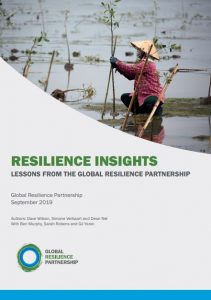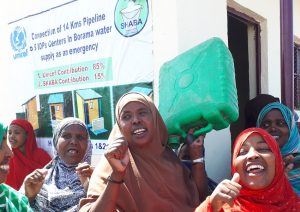“As climate change accelerates, World Water Day is an opportunity to step back and reflect on the beauty of a glass of clean water, on how lucky we are that it comes out of our taps in the UK, and how much work it means for many to hold a glass of clean water in their hands.
 So many people around the globe work hard to fulfil the human right to water by maintaining community-run schemes, running urban supplies, or collecting water from far-away places. At the same time, climate change also brings home the dangers of floods and droughts that increasingly impact us all, and the need to protect catchments that keep havoc at bay. A project under the Global Resilience Partnership (a group of around 50 partners for which Itad facilitated learning and distilled global lessons for strengthening resilience) harvested rainwater in Ethiopia and Kenya from road run-off to mitigate erosion and increase crop yields and livestock watering. The project demonstrated that, with a bit of ingenuity and working together, we can turn around the tide.”
So many people around the globe work hard to fulfil the human right to water by maintaining community-run schemes, running urban supplies, or collecting water from far-away places. At the same time, climate change also brings home the dangers of floods and droughts that increasingly impact us all, and the need to protect catchments that keep havoc at bay. A project under the Global Resilience Partnership (a group of around 50 partners for which Itad facilitated learning and distilled global lessons for strengthening resilience) harvested rainwater in Ethiopia and Kenya from road run-off to mitigate erosion and increase crop yields and livestock watering. The project demonstrated that, with a bit of ingenuity and working together, we can turn around the tide.”
Katharina Welle, Principal Consultant
“Experiences of access to water vary between different regions and countries across the globe. The upstream/downstream nature of river flows and territorial boundaries of nation-states means that access to water is inherently uneven, and therefore political. A changing climate will affect this further, and is already leading to situations of water scarcity in parts of the world.
As water availability decreases, the expectation is that conflict over water will likely increase. Evidence suggests that this isn’t the case, however. Instead, the respective need for water between stakeholders has – in most cases – led to enhanced cooperation.
Building on this spirit of collaboration, climate action needs to move from being reactive to proactive. We sit at a pivotal point in history, where climate data and projections are available but the full extent of the impacts of climate change has not yet occurred. Reflecting on World Water Day, it is imperative that we work together to mitigate against a changing climate, and that more is done to ensure water access for all, both now and in the future.”
Joseph Thompson, Consultant
“For me, on World Water Day we should reflect on how intrinsic water is to nearly every aspect of our lives. It is a chance to highlight the stark reality that one in three people globally do not have access to safe drinking water and 4.2 million people have no access to safe sanitation.
Access to water is a gender issue and can throw light on structural inequalities in our society. Would solutions to water access issues be found quicker, if it were men who had to fetch water instead of it being a women’s chore? Or if it were men requiring water, sanitation and hygiene facilities for periods every month? It is women who have to look for portable water as the services dry up or fail. It is girls who miss school when on their period, as the school lacks appropriate facilities.
Poor access to potable water, sanitation and hygiene is also a health issue It causes diarrheal diseases – the second leading cause of death for children under five worldwide. Chronic diarrheal episodes can lead to stunting, malnutrition and affect childhood development, education and future quality of life.
In emergencies, the difficulties in accessing the population, funding constraints and logistical and environmental challenges make it even more challenging to protect these fundamental human rights. Humanitarian crises in urban contexts can bring about further complexities when coupled with public health emergencies – such as we see unfolding now with COVID -19 – but is also an annual recurrence with cholera, hepatitis E and more recently, Ebola.
 Sadly, there are more challenges beyond this, with the demands that climate change and resource management bring at every level. For me, I have always been inspired to respond to the urgent needs at hand and do so in a way that builds communities resilience and sustainability for the future. Working on the recent ongoing evaluation of UNICEF WASH response in protracted crisis, it was an honour to meet the communities, organisations and donors whose work to reach the most vulnerable and maintaining standards and quality of delivery helps ensure people have access to fundamental WASH services. It was encouraging to see community user groups actively managing and holding service providers for WASH to account for delivery: our evaluation proved that enabling communities involvement, especially women’s involvement in the design, maintenance and ownership of the water service, was a win for the community delivery.”
Sadly, there are more challenges beyond this, with the demands that climate change and resource management bring at every level. For me, I have always been inspired to respond to the urgent needs at hand and do so in a way that builds communities resilience and sustainability for the future. Working on the recent ongoing evaluation of UNICEF WASH response in protracted crisis, it was an honour to meet the communities, organisations and donors whose work to reach the most vulnerable and maintaining standards and quality of delivery helps ensure people have access to fundamental WASH services. It was encouraging to see community user groups actively managing and holding service providers for WASH to account for delivery: our evaluation proved that enabling communities involvement, especially women’s involvement in the design, maintenance and ownership of the water service, was a win for the community delivery.”
Eve Mackinnon, Consultant
Check out our work on water and stay up-to-date with our work by signing up to our newsletter.
Image: Somaliand WASH user groups and water services being turned on/used © Credit: Eve Mackinnon

